19 December 2007--Economic Growth Cambodia has averaged an overal economic growth rate of 5% per year since 1990, no mean achievement. In the last three years, the growth rate has been in double-digits. But the World Bank's latest "East Asia and Pacific Update" sounds a note of caution, expecting the rate to be lowered to 9.5% in 2007. The substantial growth has been based on continued strong exports (garments), private investment, and consumption, but the report noted that "the narrow base of growth raises concern for the medium term" especially because of increased competition from Vietnam and China in the garment sector.
Cambodia has averaged an overal economic growth rate of 5% per year since 1990, no mean achievement. In the last three years, the growth rate has been in double-digits. But the World Bank's latest "East Asia and Pacific Update" sounds a note of caution, expecting the rate to be lowered to 9.5% in 2007. The substantial growth has been based on continued strong exports (garments), private investment, and consumption, but the report noted that "the narrow base of growth raises concern for the medium term" especially because of increased competition from Vietnam and China in the garment sector.
18 December 2007--More Misconduct Headlines
Click here to see headlines of official misconduct in Cambodia.
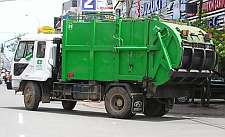
12 December 2007--More Misconduct Headlines
Click here to see headlines of official misconduct in Cambodia.

7 December 2007--More corruption
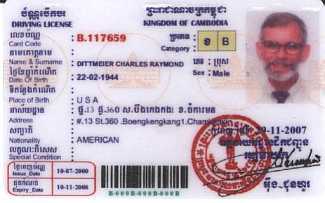 A driver's license for a foreigner is not hard to get in Cambodia. I gave my U.S.A. license and $25 to our office manager and he went to get it for me. No written or driving test. But then he came back and said that this year the price has gone up to $30. (Licenses must be renewed every year, a real cash cow.) And then today when I went to pick it up, he said that I owed him another $5 for a "medical check-up" because I am over 60. Of course, there was no check-up. (I asked the office manager if they said if I was healthy or not; no answer.) I wouldn't even mind the extra cost if the $5 went to the health services of Cambodia but of course it went into the underling's pocket, to be shared with his bosses. At least this year I didn't have to give the two boxtops with the money.... Next year I'll just tell them I'm 58 or 59.
A driver's license for a foreigner is not hard to get in Cambodia. I gave my U.S.A. license and $25 to our office manager and he went to get it for me. No written or driving test. But then he came back and said that this year the price has gone up to $30. (Licenses must be renewed every year, a real cash cow.) And then today when I went to pick it up, he said that I owed him another $5 for a "medical check-up" because I am over 60. Of course, there was no check-up. (I asked the office manager if they said if I was healthy or not; no answer.) I wouldn't even mind the extra cost if the $5 went to the health services of Cambodia but of course it went into the underling's pocket, to be shared with his bosses. At least this year I didn't have to give the two boxtops with the money.... Next year I'll just tell them I'm 58 or 59.
4 December 2007--Misconduct Headlines
Click here to see headlines of official misconduct in Cambodia.
20 November 2007--The coming of the Colonel

They said he was coming. Now his trademarked visage and an ad for Team Members and Assistant Restaurant Manager Trainees has appeared in the English-language Cambodia Daily. Can the big man himself be far behind?
18 November 2007--It's about Money Giving a more positive approach to his announcement, a development worker said she thought it would be good for him to get out of the country where he would hear "frank and candid opinions or ideas or questions" which he doesn't hear here in Cambodia.
A recent brief article in The Cambodia Daily newspaper reported that Prime Minister Hun Sen is considering going on the international lecture tour. "I think in the future I will make money from being a speaker," he said. At least he acknowledges he's doing it for the money.
9 November 2007--Camko City
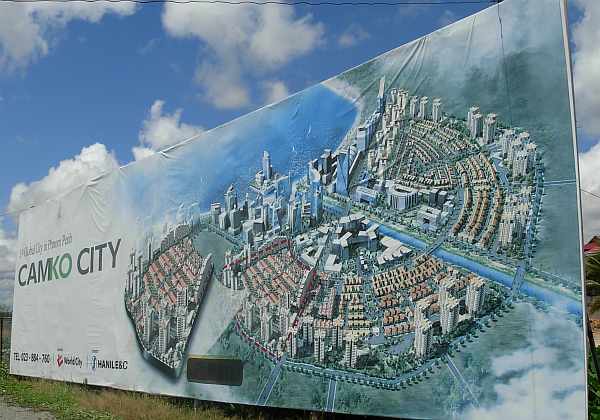
Several large signs have appeared in Phnom Penh advertising "Camko City," the "First Global City in Phnom Penh." I'm not sure what that means. I bicycled past the site of the proposed development a few weeks ago and found this sign there. Seemingly it is an all-new self-contained satellite city of Phnom Penh but whether it ever looks like this sign remains to be seen. There is no zoning in Cambodia and so the roads, electricity, water, etc., are all up in the air. It's likely that the buildings will be put up but the roads will not be developed and the load on the power grid will only cause more blackouts for the area. The large lake on the sign pictures sailboats--big sailboats--plying the waters off the beach. In reality Camko City (the name probably represents "Cambodia" and "Korea") is being built on a boeung, a marshy area, where the water depth is usually a foot or two.
4 November 2007--North Korea Connections
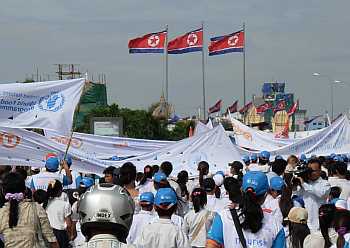 During a march against child hunger organized by the World Food Program and TNT courier service, we passed these flags of North Korea on one of Phnom Penh's main streets. The premier of North Korea is finishing a four-day visit today and one of the final activities will be the signing of an investment agreement. The pact will help the hermit kingdom emerge from economic isolation and Cambodia hopes to attract North Korean investments, possibly in the area of cement and fertilzer production. The Cambodian Commerce minister compared the situation of North Korea today to that of Cambodia in the years immediately after the fall of the Khmer Rouge when Cambodia was shunned by much of the international community. Cambodia and North Korea have had very strong relations over the years. The retired King Sihanouk has a home in North Korea.
During a march against child hunger organized by the World Food Program and TNT courier service, we passed these flags of North Korea on one of Phnom Penh's main streets. The premier of North Korea is finishing a four-day visit today and one of the final activities will be the signing of an investment agreement. The pact will help the hermit kingdom emerge from economic isolation and Cambodia hopes to attract North Korean investments, possibly in the area of cement and fertilzer production. The Cambodian Commerce minister compared the situation of North Korea today to that of Cambodia in the years immediately after the fall of the Khmer Rouge when Cambodia was shunned by much of the international community. Cambodia and North Korea have had very strong relations over the years. The retired King Sihanouk has a home in North Korea.
25 October 2007--Maternal Mortality
Every five years the UN Children's Fund surveys and publishes a report on maternal mortality, the number of mothers who die because of problems with childbirth. The latest report, published in October, attributes the second highest rate of maternal mortality in Southeast Asia to Cambodia. The highest mortality rate was in Laos which saw 660 deaths of mothers for every 100,000 births. Cambodia's mother mortality rate was 540 deaths per 100,000. The lowest rate in the region was Brunei with just 13 deaths. The report said that 1 of every 48 mothers in Cambodia has a risk of dying due to birth complications. That same rate in Burma is 1 death for every 110 mothers.
29 September 2007--Child Labor
Because of the type of soil in the area, the Cambodian province of Kandal is home to many brick-making plants. More than 60 such factories are located in one district alone. Recently LICADHO, a human rights group, helped organize a march of human rights activists, child protection workers, and provincial officials to highlight the dangers to children working in these factories. Since 2000, 11 children have lost an arm in brick-making machinery in just two communes (groups of villages) in the district. The goal of the action was not to eliminate all child labor in brick production but to limit their involvement to less dangerous activities such as carrying bricks(!). An advisor from the International Labor Organization said that brick making is among the worst forms of child labor in Cambodia but that the number of such workers is increasing, not decreasing, as strong economic growth creates demands for more buildings and more bricks.
24 September 2007--Constitution Day
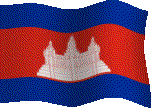 Today is Constitution Day in Cambodia, one of the 23 public holidays the country celebrates. It's not a day that apparently means much to people here. There were very few signs that people were aware of a holiday. I saw two or three flags flying from the front of some homes and businesses, but that was it. Maybe there were some government celebrations and those photographs will appear in the newspapers tomorrow. The observances today probably match the esteem given to the constitution. It seems to be more a bother to the government than a foundational legal document on which the rights of the people are based. When the constitution is mentioned, it's usually in a context in which it is trumped by money and power. According to a donor I work with, the Cambodian constitution still has not been translated into the Khmer language! A Japanese group is funding the translation.
Today is Constitution Day in Cambodia, one of the 23 public holidays the country celebrates. It's not a day that apparently means much to people here. There were very few signs that people were aware of a holiday. I saw two or three flags flying from the front of some homes and businesses, but that was it. Maybe there were some government celebrations and those photographs will appear in the newspapers tomorrow. The observances today probably match the esteem given to the constitution. It seems to be more a bother to the government than a foundational legal document on which the rights of the people are based. When the constitution is mentioned, it's usually in a context in which it is trumped by money and power. According to a donor I work with, the Cambodian constitution still has not been translated into the Khmer language! A Japanese group is funding the translation.
13 September 2007--Phnom Penh, Not the First Choice
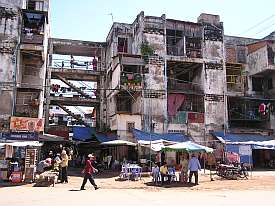 The Economist magazine last month published a city livability ranking, rating 132 cities from around the world on such factors as recreational and cultural activity, traffic congestion, and crime rates. Vancouver, Melbourne, and Vienna were at the top of the list. Phnom Penh was no. 125, eighth from the bottom, just below Bogota, Colombia and Tehran, Iran. "Of the 132 cities surveyed, only nine cities present the worst-case scenario in which most aspects of living quality are severely restricted," the report said.
The Economist magazine last month published a city livability ranking, rating 132 cities from around the world on such factors as recreational and cultural activity, traffic congestion, and crime rates. Vancouver, Melbourne, and Vienna were at the top of the list. Phnom Penh was no. 125, eighth from the bottom, just below Bogota, Colombia and Tehran, Iran. "Of the 132 cities surveyed, only nine cities present the worst-case scenario in which most aspects of living quality are severely restricted," the report said.
5 September 2007--Dengue Season
 Abate is a chemical--a larvicide--used to control mosquitoes. It is put into clean water to keep mosquitoes from reproducing but the water remains drinkable. This year at the height of the dengue fever season, Cambodia has run out of Abate. 50 tons was distributed in the provinces and municipalities most at risk from the mosquito-borne illness, but the supplies on hand have been exhausted. Another 50 to 60 tons of the chemical are needed for application in a second round of prevention. 25 tons have been promised by the World Health Organization and further supplies may be provided by the Red Cross and the World Bank.
Abate is a chemical--a larvicide--used to control mosquitoes. It is put into clean water to keep mosquitoes from reproducing but the water remains drinkable. This year at the height of the dengue fever season, Cambodia has run out of Abate. 50 tons was distributed in the provinces and municipalities most at risk from the mosquito-borne illness, but the supplies on hand have been exhausted. Another 50 to 60 tons of the chemical are needed for application in a second round of prevention. 25 tons have been promised by the World Health Organization and further supplies may be provided by the Red Cross and the World Bank.
28 June 2007--Cambodian Officialdom #2 On Tuesday, when the wreckage of the plane had still not been located, the director of the State Secretariat of Civil Aviation proclaimed: "We don't know yet if it crashed into a mountain or what. It was not a machinery matter. It was a weather matter." Interesting comment, given that the plane had not been found yet and the cause of the crash not yet investigated. What would be your guess about this statement from Cambodian officialdom? A plane carrying 20 people crashed Monday morning on a domestic flight from Siem Reap to the newly reopened airport in Sihanoukville (opened in January after being closed since the early 1980s). The plane was owned by the "accident-prone" PMT company.
A plane carrying 20 people crashed Monday morning on a domestic flight from Siem Reap to the newly reopened airport in Sihanoukville (opened in January after being closed since the early 1980s). The plane was owned by the "accident-prone" PMT company.
27 June 2007--Cambodian Officialdom #1 It is the custom for people to put up tents in the street for weddings and funerals, but blocking a major street goes a bit too far. The police official even had a fire engine present to wash off the street on Monday. And Tuesday. And Wednesday. In Phnom Penh fire engines rarely even go to fires. I have only seen one at a fire in more than seven years here. But this arrogant official had one to wash off the street he was blocking for three days.
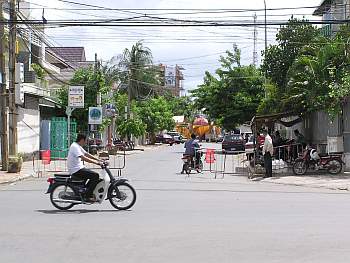
Street 310 is a major east-west street in our area of Phnom Penh, one of only four that crosses the major north-south street. Monday the street was blocked by a big yellow and orange tent for a wedding of some relative of some high police official. Completely blocked. With police to keep out the commoners.
12 June 2007--UN Right Envoy Unwelcome in Cambodia
Yash Ghai is the UN human rights envoy with responsibility for Cambodia. In previous visits, his outspoken reports critical of the Cambodian government's treatment of human rights have been a cause of angry outbursts by Prime Minister Hun Sen and his ministers. Ghai returned to Cambodia for his third official visit on 29 May but predictably the prime minister lashed out at him again, criticizing the report, saying he had refused to meet the envoy, and comparing Ghai to a barking dog. In typical bombast, in a nationwide speech, on the day Ghai left, the prime minister said: "If you continue to stay [in Cambodia] for another 1,000 years and if I survive another 1,000 years, I still will not meet you." Such vacuous rhetoric plays well with the uneducated masses. [Ghai is scheduled to deliver his report on Cambodia to the UN today.]
31 May 2007--What Transparency International is talking about...
Do you think anyone will prosecute the prosecutor and other court officials for malfeasance and dereliction of duty?
Transparency International's recent report pointed out the sorry state of judicial process in Cambodia. On the same page of the Cambodia Daily with the article about Transparency International was another article that showed what the report meant. Some of the second article's major points:
30 May 2007--Transparency International According to the Cambodia Daily, "Justice Ministry Secretary of State Meach Sam On said that the views in the report only reflected the view of Transparency International. He added that there was some corruption, but it was difficult to find and root out. 'It is hard to see the people who commit it,' he said." That's hardly true.
I sometimes have guilty feelings commenting on so much that is bad in Cambodia, especially the government. (For the good news, look at Daily Life in Cambodia and other sections.) But it is really hard to imagine the terrible shape the country is in because of the government. It's not only my opinion. Transparency International which assesses and compares judicial systems in countries around the world just produced their latest report which stated that Cambodia's lower courts "do not meet basic international standards, and lack transparency, consistency, and due process. From the moment one becomes involved with the judicial system, either as a defendant or as a party to a civil case, one encounters misuse of entrusted power for private gain."
24 May 2007--The Effects of Impunity
Thirteen youths arrested following a gunfight and car-ramming rampage near the Spark nightclub on Thursday morning that left a police officer fighting for his life were handed over to the Municipal Military Police on Friday, officers said. Chamkar Mon district military police chief Khun Sam Ol said the youths, many of whom are the sons of government officials, have not been sent to court yet. "Ask the Municipal [Military Police]. They are there. They are out of my hands," he said. Thon Vandet, 38, deputy chief of immigration police at Phnom Penh International Airport was driving past the street battle, which involved some 30 youths, when he was struck by a bullet in the chest, police said. The majority of the brawlers escaped in cars with their weapons leaving military police to arrest 13 and confiscate three high-end vehicles. Among the detained youths are the son of a Kampot province court clerk and the son of a Phnom Penh district deputy governor, Khun Sam Ol said. He declined further comment. Neither municipal military police commander Ya Kim Y nor his deputy, Viet Than, could be reached for comment. Ouk Sophat, also a deputy commander, said he did not know the whereabouts of the 13 as it was not his case.
The children of high-level officials regularly create havoc in society--and just as regularly get away with it. The nephews of the prime minister are notorious for the incidents they have been involved in. These delinquents don't necessarily hide their misbehavior. They don't have to. Officials are afraid to touch them. Following is a complete article from The Cambodia Daily which illustrates the hands-off attitude of officialdom toward the children of government and military officials. [Emphasis added]:
Arrested Youths Handed To Military Police
21 May 2007--More Corruption Cambodia has the lowest ratio of government revenue (the money the government takes in) to GDP of all the countries in the Asia-Pacific region because of the rampant smuggling. The government could do something about it but the will is not there, only denial. According to the Cambodia Daily, the "acting chief of customs in Banteay Meanchey said that since he took over in December, 2006, there has been no smuggling. 'I tighten things up,' he said. 'I am careful." [The] customs branch chief in Battambang said he did not know how--or where--all that beer was sneaking into Cambodia. 'There have been no problems in my province,' he said, declining to comment further." Imported beer is taxed at about 84% of its value so the government lost about $22 million dollars to the beer smugglers. That amounts to 3% of all the government revenue for last year. And not only the government is hurt. Local beer producers also suffer because they don't have the economies of scale and efficient infrastructure, nor the cheap electricity, which benefit their competitors, the importers. It's estimated that one fourth of the carbonated soft drinks sold in Cambodia are also contraband. The resulting economic climate is so bad that Swiss foods giant Nestle closed its plant in Cambodia a few years ago because its locally made milk products couldn't compete with the smuggled goods.
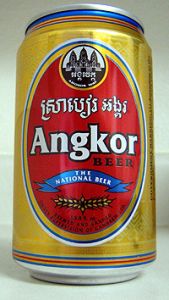 According to official Thai customs records, Thailand exported 5.22 million cases of beer to Cambodia in 2006. 35% of the beer consumed in Cambodia is imported. Funny thing, though, according to official Cambodian customs records, only 130,000 cases of beer were imported. Are the other 5 million cases still stacked up there at the border? Hardly. They were brought into the country by smugglers.
According to official Thai customs records, Thailand exported 5.22 million cases of beer to Cambodia in 2006. 35% of the beer consumed in Cambodia is imported. Funny thing, though, according to official Cambodian customs records, only 130,000 cases of beer were imported. Are the other 5 million cases still stacked up there at the border? Hardly. They were brought into the country by smugglers.
13 May 2007--More corruption
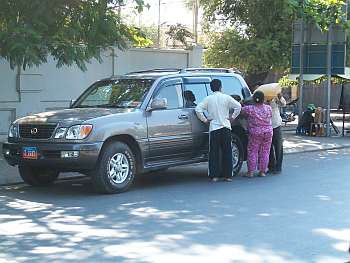 One of the reasons Cambodia has such poverty is because of the official corruption that keeps government revenues low. It is estimated that millions and millions of tax dollars are not collected each year because those who should pay taxes instead pay bribes so that they won't be charged. Smuggling is another reason for lost revenues. A good percentage (most?) of the gasoline brought into the country is smuggled to avoid the payment of tax. When I see someone buying gasoline like this on the street, the immediate suspicion is that it is smuggled. Notice the license plate which indicates the SUV owner is a military official.
One of the reasons Cambodia has such poverty is because of the official corruption that keeps government revenues low. It is estimated that millions and millions of tax dollars are not collected each year because those who should pay taxes instead pay bribes so that they won't be charged. Smuggling is another reason for lost revenues. A good percentage (most?) of the gasoline brought into the country is smuggled to avoid the payment of tax. When I see someone buying gasoline like this on the street, the immediate suspicion is that it is smuggled. Notice the license plate which indicates the SUV owner is a military official.
7 May 2007--Press Freedom Now the government routinely uses a disinformation law to seek revenge on journalists who offend the government's sensibilities. Many media people disagree with Freedom House's ranking, saying that the disinformation law is used against journalists for offenses such as allegedly insulting a court official or a judge's wife.
Freedom House, a US-based watchdog of the world press, has raised Cambodia's press ranking from "not free" to "partly free" because of a change in the defamation law and reduced harassment of journalists. Before, the government's favored way of countering negative press coverage was to charge newspaper and other media people with defamation under an old law enacted during the UNTAC period when Cambodia was administered by the United Nations. Due to increasing international pressure, the UNTAC penal code was amended to remove jail terms as punishment.
1 May 2007--Cambodia, a Fragile State The reason is what is called "the curse of plenty". Many of the countries added to the list have increasing revenues, e.g, from oil as in Angola and Nigeria, and from tourism as is the situation in Cambodia. But global economists warn that increasing wealth quickly can actually harm the rest of the economy, putting pressure on local currencies, and according to TIME magazine, increasing "the temptation for corruption and, in many of these fragile state, erod[ing] incomes, institutions, and governance. Cambodia, for example, has been growing at about 5 percent a year, faster than most very poor countries, yet fell onto the 'fragile states' list due in part to widespread corruption."
 The Independent Evaluation Group of the World Bank has a list of nations which are at risk of political and economic collapse. There are 26 of these "fragile states". Cambodia is one of the most recent additions to the list even though its economy has been growing more quickly the last few years than other Asian country except China and Singapore.
The Independent Evaluation Group of the World Bank has a list of nations which are at risk of political and economic collapse. There are 26 of these "fragile states". Cambodia is one of the most recent additions to the list even though its economy has been growing more quickly the last few years than other Asian country except China and Singapore.
24 April 2007--Corruption, Malfeasance, Incompetence... Cops Get Seized Weapons, Event Under Wraps Police Yet To File Warrants on Alleged Child-Rapists Land-Grabbers Having Their Way with National Park
The headline of the first article on the next page:
Two Policemen Suspected in Shootings At Large: Officials
For those who ask what Cambodia is like, here is a sample of three articles printed one after another on the National page of The Cambodia Daily on 22 December 2006:
This article related how hundreds of weapons used as court evidence were turned over to the police in a courthouse ceremony. Most interesting were accompanying comments by the Municipal Governor who noted that drunken policemen and RCAF soldiers are responsible for most nighttime shootings. But police on duty at the courthouse had a blacklist of the English-speaking and more liberal newspapers and media outlets and wouldn't let them into the courthouse to hear the governor's remarks in a governor-approved attempt at censorship. After the ceremony, reached by telephone, the governor said he was too busy to speak to a reporter.
A month ago, a 12-year old girl was repeatedly raped over a three-day period in the commune police station, allegedly by three policemen who have since disappeared. But the police have not yet got around to issuing arrest warrants for the fugitives. The head of a rights group said the police would like to bury the case by accusing the child's mother of looking for money and by not cooperating with the investigations of the rights groups. The rights official said that the police particularly don't want to arrest the three because one is the son of the district deputy governor who has admitted his son's guilt and tried to buy his way out of the situation by offering $500 to the victim's family.
There is a large national park outside the port city of Sihanoukville. Land-grabbing by the rich and powerful is an on-going problem in Cambodia, but when it was announced that the Sihanoukville airport was to be renovated and reopened, encroachment and land-grabbing began on a massive scale. Hundreds of acres within the park have been cleared already, mostly at night, and the park's director names "several senior government officials and rich people" as being involved. The Municipal Governor of Sihanoukville said he was too busy to talk to a reporter.
23 April 2007--Progress--at a snail's pace
As a good example of the low level of development in Cambodia--and the low level of hope for improvement, an official from the Ministry of Industry, Mines, and Energy noted that more than 80% of Cambodia lacks electricity. However, he said, the government wants to have electricity in each village by 2020 and in 70% of homes by 2030. 2030! Can you imagine waiting more than 20 years to get electricity in 70% of the country's homes when the country is only the size of the U.S. state of Missouri? Either the country REALLY has no capacity and resources or the government is just REALLY inefficient and incompetent.
12 April 2007--Debating the 2004 Budget!
 This week the National Assembly finally began its debate on the budget--the 2004 budget! In most countries, the budget is approved BEFORE it is spent, but under Cambodian law, the Assembly each year must discuss and approve governmental expenditures for the previous year. (Somewhat akin to debating, after the horse escapes, whether the barn door should now be closed or left open?) The amounts spent by the various ministries seem, from the figures offered in the debate, to have little correspondence with what was allocated. Rural Development was appropriated $6 million and spent $20 million; Public Works was given $3.8 million and spent $28 million; Health was budgeted $57 million but spent only $49 million. The whole assembly seems to operate on the principle that guides the lives and fortunes of so many rich and influential officials in Cambodia: do what you want.
This week the National Assembly finally began its debate on the budget--the 2004 budget! In most countries, the budget is approved BEFORE it is spent, but under Cambodian law, the Assembly each year must discuss and approve governmental expenditures for the previous year. (Somewhat akin to debating, after the horse escapes, whether the barn door should now be closed or left open?) The amounts spent by the various ministries seem, from the figures offered in the debate, to have little correspondence with what was allocated. Rural Development was appropriated $6 million and spent $20 million; Public Works was given $3.8 million and spent $28 million; Health was budgeted $57 million but spent only $49 million. The whole assembly seems to operate on the principle that guides the lives and fortunes of so many rich and influential officials in Cambodia: do what you want.
11 April 2007--More impunity This recurring pattern of violence, mayhem, and abuse by the children of wealthy and influential officials says a lot about what they learn at home and the attitudes that prevail there!
The children of two influential families in Pailin province, in northwestern Cambodia, were involved in a confrontation after a car driven by members of one family was involved in an accident with a motorcycle driven by a member of the other family. The son of the municipal police chief and the son of the chief of the province agricultural department were arrested for beating the victims and destroying their property. The victims were the niece and nephew of the Pailin Governor.
4 April 2007--Commune Elections (continued) This photo shows Maryknoll lay missioner Roberta McLaughlin (center, yellow shirt) working as one of the international election observers at a polling place in Phnom Penh last Sunday. [Photo from Jim McLaughlin.]
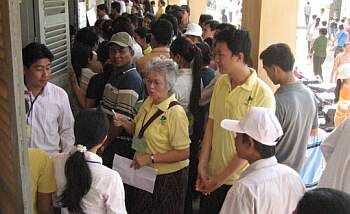 Despite a relatively low voter turnout--or maybe because of it, the Cambodian People's Party (CPP) won control of 1,592 of the country's 1,621 communes, according to unofficial results from Sunday's polling. The results did not surprise anyone because of the hold the ruling CPP has on local politics especially in the rural areas where 65% of the population is illiterate and depends on government media which constantly promote the accomplishments of the CPP in providing roads, schools, etc. And a lot what they say is true. The Prime Minister is constantly announcing CPP-built infrastructure projects. It seems half the schools in the country bear his name because he has given the money. He's a "man with a big heart" someone waggishly noted at a recent meeting.
Despite a relatively low voter turnout--or maybe because of it, the Cambodian People's Party (CPP) won control of 1,592 of the country's 1,621 communes, according to unofficial results from Sunday's polling. The results did not surprise anyone because of the hold the ruling CPP has on local politics especially in the rural areas where 65% of the population is illiterate and depends on government media which constantly promote the accomplishments of the CPP in providing roads, schools, etc. And a lot what they say is true. The Prime Minister is constantly announcing CPP-built infrastructure projects. It seems half the schools in the country bear his name because he has given the money. He's a "man with a big heart" someone waggishly noted at a recent meeting.
2 April 2007--Ten Years Later
One of those injured was an American citizen and that prompted the FBI to investigate the crime. Three months later, the Washington Post newspaper published a story which quoted sources as saying the FBI had tentatively connected the attack with the bodyguards of Prime Minister Hun Sen. The Cambodia Daily (30 March 2007) reported:
"This attack was intended to destroy serious political pluralism in Cambodia, and it partially succeeded. Politics in Cambodia has never fully recovered," Rights Watch claimed. According to Brad Adams, Human Rights Watch's Asia director, the attack was part of a wave of violence and intimidation in th lead-up to the national elections of 1998. "The CPP's continued hold on power since and its continued impunity for systematic human rights abuses is the direct result of what happened in 1997," he wrote.... Teng Savorn, second deputy director general of the National Police and the head of the government committee tasked with investigating the grenade attack, said he was busy with his work...and could not comment. ...Jeff Daigle, US Embassy spokesman, wrote in an e-mail that "the FBI investigation was inconclusive," adding that the embassy was not aware of any plans by the FBI to reopen its investigation. This photograph is of a memorial that was erected near the site of the blast.
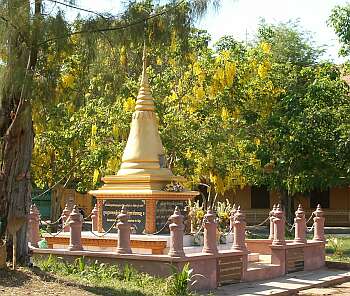 Ten years ago, on 30 March 1997, grenades were thrown into a peaceful gathering of opposition party supporters demonstrating outside the National Assembly in Phnom Penh. 16 people were killed and more than 200 were injured. No arrests were ever made in connection with the killings.
Ten years ago, on 30 March 1997, grenades were thrown into a peaceful gathering of opposition party supporters demonstrating outside the National Assembly in Phnom Penh. 16 people were killed and more than 200 were injured. No arrests were ever made in connection with the killings.
The Cambodian authorities have never conducted a serious investigation into this attack, either despite or because of substantial evidence of government involvement," New York-based Human Rights Watch alleged in a statement....
1 April 2007--Commune Council Elections (continued)
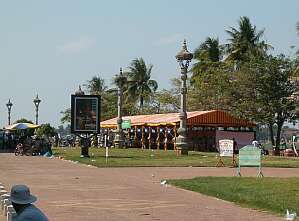
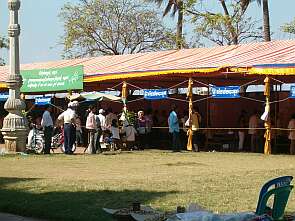
This election day reminded onlookers of a day during the Khmer New Year celebration because of the absence of traffic and people on the streets and so many businesses closed. This tent was set up as a polling place along the river in the Daun Penh area of Phnom Penh. The photo was taken a little after 3:00 PM, just after the polls officially closed.
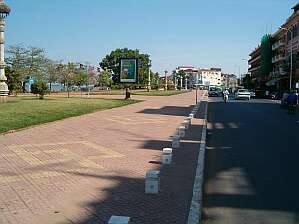 This is Sothearos Street, and on a normal Sunday afternoon it is jammed with tens of thousands of pedestrians, motorcycles, tuk-tuks, the Landcruisers and Lexus 4WDs of the rich, and the occasional elephant. But today it was basically empty. Many, many people returned to their home provinces to vote, and many others probably stayed off the streets because of the uncertainty and possibility for violence surrounding any kind of political activity in Cambodia.
This is Sothearos Street, and on a normal Sunday afternoon it is jammed with tens of thousands of pedestrians, motorcycles, tuk-tuks, the Landcruisers and Lexus 4WDs of the rich, and the occasional elephant. But today it was basically empty. Many, many people returned to their home provinces to vote, and many others probably stayed off the streets because of the uncertainty and possibility for violence surrounding any kind of political activity in Cambodia.
31 March 2007--Commune Council Elections It's arguable how much the results of the elections will influence anything. The local government levels are firmly under control of the ruling Cambodian People's Party (CPP) in most places, and I don't believe any opposition candidates have been assassinated in this campaign so it may be an indication that the CPP isn't really worried or that the elections don't make any difference anyway. 16 opposition candidates were killed in the last campaign before the vote for seats in the national assembly. There was a heavy police presence on the streets last night, the last night of official campaign when the twelve political parties had their big rallies. The campaign period was limited to about two weeks and there was no campaigning allowed today (Saturday) before the elections tomorrow. In an unusual move, the government banned all text messages from midnight Friday night until 3:00 PM on Sunday when the voting ends. In the picture above, supporters of the CPP prepare for a drive-around rally through the streets of Phnom Penh. Maybe the sheer show of numbers impresses some people, but it seems the ones who gain the most from these rallies are those who print the T-shirts, caps, and flags and those who rent the trucks for hauling people around.
 Tomorrow Cambodia holds its fourth election in the history of the country. 102,000 candidates are vying for 10,400 positions on commune councils in 1,600 communes around Cambodia. A commune is a group of villages.
Tomorrow Cambodia holds its fourth election in the history of the country. 102,000 candidates are vying for 10,400 positions on commune councils in 1,600 communes around Cambodia. A commune is a group of villages.
29 March 2007--It doesn't look good... Now a faulty generator has been causing more power cuts the past month, according to the electricity company. More than forty different private companies are involved in generating electricity and selling it to Electricite du Cambodge which then resells it to consumers and to other distributors. It's a real hodgepodge system. The failing generator has an output of only eight megawatts but that's a big percentage of the limited electrical supply for the city. Discussions about how to repair the generator have begun but probably the city's chronic shortages will not be eliminated until the hoped-for connection of the city to Vietnam's power grid.
Last year power outages in Phnom Penh were really unsettling, many days having one in the morning or afternoon, and then another at night. The ones at night were especially aggravating. But then a new generator was added to the power grid, and the situation stabilized.
25 March 2007--UXO One of the mine-clearing organizations in Cambodia estimates there are between 2 million and 6 million unexploded cluster munitions in Cambodia. Cambodia recently became the 47th country to support the Oslo Declaration's efforts to produce an anti-cluster bomb treaty by 2008.
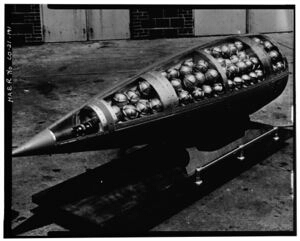 In the jargon of the mine clearing community, UXO stands for "UneXploded Ordnance." Usually you will see articles refer to landmines and UXO. The UXO are the bombs that were dropped and the shells that were fired and the grenades that were thrown but never exploded. A recent addition to the UXO category are the cluster-bomb munitions. Cluster bombs, dropped from planes or fired from artillery, contain hundreds of small bomblets that are scattered over a wide area and remain unexploded, serving as a type of surface landmine.
In the jargon of the mine clearing community, UXO stands for "UneXploded Ordnance." Usually you will see articles refer to landmines and UXO. The UXO are the bombs that were dropped and the shells that were fired and the grenades that were thrown but never exploded. A recent addition to the UXO category are the cluster-bomb munitions. Cluster bombs, dropped from planes or fired from artillery, contain hundreds of small bomblets that are scattered over a wide area and remain unexploded, serving as a type of surface landmine.
24 March 2007--Traffic Fatalities Nationwide, 130 traffic deaths were reported in Cambodia in the month of January, 2007. By comparison, 127 people were killed in New Hampshire in all of 2006. An average of 4 people a day die on the roads of Cambodia.
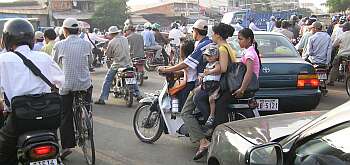
15 February 2007--Ruling Party Gifts The ruling party, the Cambodian People's Party (CPP) recently claimed they have surpassed the 5,000,000 membership mark (out of a population of 13,000,000). Some wonder whether it is due to the gifts that the political parties give out. Supposedly gifts are only spread among those who are already members, but others wonder if it's not just a form of vote-buying. The parties take care of their members. Loyal party stalwarts who put up a party sign like this one (supplied by the party) at their home or business are rewarded with about $2.50 a month, a significant amount in this country.
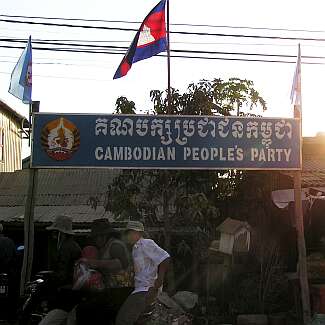
8 February 2007--The government at work Traffic in Cambodia is a really relevant indicator of the competence of the government. The director of land transport in the Ministry of Public Works and Transport recently said that of the 500,000 motorbikes licensed in the kingdom, only 2000 of their drivers have licenses. And he's not even referring to the thousands of unregistered motorcycles!
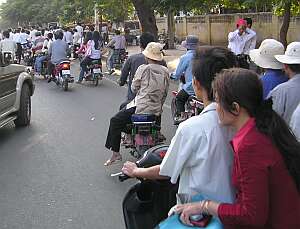
31 January 2007--More impunity In 2004, according to the Cambodia Daily, an irrigation canal was built in Kandal Province to serve hundreds of poor farmers. Now a ruling party senator and close aide to the senate president is digging a fish pond that threatens the structural integrity of the canal. The Kandal Water Resource Director negotiated a compromise in which the senator could dig within eight meters of the canal but he was overruled by his boss who wrote to the Kandal governor to stop the senator from digging on the state land. Several officials claim to know nothing of the whole matter while the Kandal Water Resource Director acknowledged that any solution to the problem depends on high officials because of the high level of the senator. (Heck, what good is it being a senator if you can't do what you want?)

28 January 2007--Not Free, Not Fair Cambodia has a Committee for Free and Fair Elections (COMFREL) which, according to the Cambodia Daily, charged last week that the state-run television station TVK has favored the ruling Cambodia People's Party (CPP) in television coverage of political parties. COMFREL found that in the first week of January, from 5:00 to 11:00 PM, CPP got 99% of the political coverage. TVK's director said he isn't biased, but that TVK's perspective is to serve the government.
25 January 2007--Give up our impunity??? More than 30 NGOs in Cambodia petitioned the National Assembly to rework the Anti-Corruption Law draft to make insure that it complies with international standards. The law has been in process for more than twelve years. It's not hard to guess why there is little enthusiasm within this government for an anti-corruption measure. The law as it stands does not stipulate that the body investigating corruption is independent of the government; it does not have clear measures to protect witnesses and victims of corruption; it does not provide for the police to report concerning corruption to the anti-corruption group instead of to the (corrupt) judiciary; and it doesn't require public officials to declare their assets. "We think that as long as the anti-corruption law does not comply with international standards...the law is useless," the NGOs said. A ruling party lawmaker blamed the NGOs for the delay in passing the law by always asking that it be revised. [From the Cambodia Daily, 11 December 2006]

19 January 2007--More Impunity
In early December, 2006, 39 officials from Banteay Meanchey Province (in the northwest of Cambodia, along the Thai border) were reprimanded for involvement in a car-smuggling operation. The officials were transferred or demoted. "This action is just the prime minister's light fist," the Anti-Corruption Committee chief told the press. (Earlier Prime Minister Hun Sen had promised an "iron fist" against evil doers.) Light fist, indeed! These officials smuggled 800 cars and SUVs, costing the government lost tax revenue of millions of dollars. The officials will have to work without pay for six months, a non-punishment since an official salary is probably less than $50 a month and they probably made tens of thousands of dollars from the smuggling. Impunity reigns! [From the Cambodia Daily, 7 December 2006]